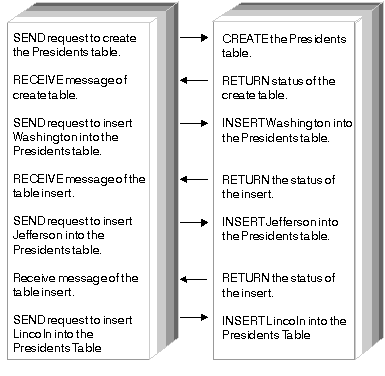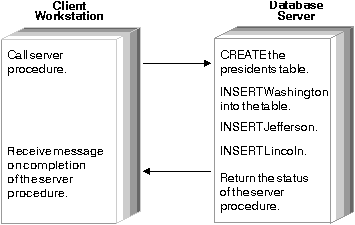

Following is a sample program demonstrating the use of an input SQLDA structure. The client application invokes a stored procedure that creates a table named Presidents and loads the table with data.
This program creates a table called Presidents in the SAMPLE database. It then inserts the values Washington, Jefferson, and Lincoln into the table.
Without using stored procedures, the sample program would have been designed to transmit data across the network in four separate requests in order to process each SQL statement, as shown in Figure 11.
Figure 11. Input-SQLDA Sample Without a Stored Procedure
 |
Instead, the sample program makes use of the stored procedures technique to transmit all of the data across the network in one request, allowing the server procedure to execute the SQL statements as a group. This technique is shown in Figure 12.
Figure 12. Input-SQLDA Sample With a Stored Procedure
 |
A sample input-SQLDA client application and sample input-SQLDA stored procedure is shown on "How the Example Input-SQLDA Client Application Works".
The CHECKERR macro/function is an error checking utility which is external to the program. The location of this error checking utility depends upon the programming language used:
See Using GET ERROR MESSAGE in Example Programs for the source code for this error checking utility.
program inpcli
implicit none
* Copy Files for Constants and Structures
include 'sql.f'
include 'sqlenv.f'
include 'sqlutil.f'
include 'sqldact.f'
* Declare an SQLCA
EXEC SQL INCLUDE SQLCA
* Declare host variables.
EXEC SQL BEGIN DECLARE SECTION
character*8 dbname
character*8 userid
character*18 passwd
character*11 procname /'inpsrv'/
character*10 table_name /'PRESIDENTS'/
character*20 data_item0 /'Washington'/
character*20 data_item1 /'Jefferson'/
character*20 data_item2 /'Lincoln'/
integer*2 tableind /0/
integer*2 dataind0 /0/
integer*2 dataind1 /0/
integer*2 dataind2 /0/
EXEC SQL END DECLARE SECTION
* Declare Variables Used to Create an SQLDA
integer*2 sqlvar1
parameter ( sqlvar1 = sqlda_header_sz + 0*sqlvar_struct_sz )
integer*2 sqlvar2
parameter ( sqlvar2 = sqlda_header_sz + 1*sqlvar_struct_sz )
integer*2 sqlvar3
parameter ( sqlvar3 = sqlda_header_sz + 2*sqlvar_struct_sz )
integer*2 sqlvar4
parameter ( sqlvar4 = sqlda_header_sz + 3*sqlvar_struct_sz )
* Declare an Input SQLDA Structure -- 4 Variables
character io_sqlda(sqlda_header_sz + 4*sqlvar_struct_sz)
character*8 io_sqldaid ! Header
integer*4 io_sqldabc
integer*2 io_sqln
integer*2 io_sqld
integer*2 io_sqltype1 ! First Variable
integer*2 io_sqllen1
integer*4 io_sqldata1
integer*4 io_sqlind1
integer*2 io_sqlnamel1
character*30 io_sqlnamec1
integer*2 io_sqltype2 ! Second Variable
integer*2 io_sqllen2
integer*4 io_sqldata2
integer*4 io_sqlind2
integer*2 io_sqlnamel2
character*30 io_sqlnamec2
integer*2 io_sqltype3 ! Third Variable
integer*2 io_sqllen3
integer*4 io_sqldata3
integer*4 io_sqlind3
integer*2 io_sqlnamel3
character*30 io_sqlnamec3
integer*2 io_sqltype4 ! Fourth Variable
integer*2 io_sqllen4
integer*4 io_sqldata4
integer*4 io_sqlind4
integer*2 io_sqlnamel4
character*30 io_sqlnamec4
equivalence( io_sqlda(sqlda_sqldaid_ofs), io_sqldaid )
equivalence( io_sqlda(sqlda_sqldabc_ofs), io_sqldabc )
equivalence( io_sqlda(sqlda_sqln_ofs), io_sqln )
equivalence( io_sqlda(sqlda_sqld_ofs), io_sqld )
equivalence( io_sqlda(sqlvar1+sqlvar_type_ofs), io_sqltype1 )
equivalence( io_sqlda(sqlvar1+sqlvar_len_ofs), io_sqllen1 )
equivalence( io_sqlda(sqlvar1+sqlvar_data_ofs), io_sqldata1 )
equivalence( io_sqlda(sqlvar1+sqlvar_ind_ofs), io_sqlind1 )
equivalence( io_sqlda(sqlvar1+sqlvar_name_length_ofs),
+ io_sqlnamel1 )
equivalence( io_sqlda(sqlvar1+sqlvar_name_data_ofs),
+ io_sqlnamec1 )
equivalence( io_sqlda(sqlvar2+sqlvar_type_ofs), io_sqltype2 )
equivalence( io_sqlda(sqlvar2+sqlvar_len_ofs), io_sqllen2 )
equivalence( io_sqlda(sqlvar2+sqlvar_data_ofs), io_sqldata2 )
equivalence( io_sqlda(sqlvar2+sqlvar_ind_ofs), io_sqlind2 )
equivalence( io_sqlda(sqlvar2+sqlvar_name_length_ofs),
+ io_sqlnamel2 )
equivalence( io_sqlda(sqlvar2+sqlvar_name_data_ofs),
+ io_sqlnamec2 )
equivalence( io_sqlda(sqlvar3+sqlvar_type_ofs), io_sqltype3 )
equivalence( io_sqlda(sqlvar3+sqlvar_len_ofs), io_sqllen3 )
equivalence( io_sqlda(sqlvar3+sqlvar_data_ofs), io_sqldata3 )
equivalence( io_sqlda(sqlvar3+sqlvar_ind_ofs), io_sqlind3 )
equivalence( io_sqlda(sqlvar3+sqlvar_name_length_ofs),
+ io_sqlnamel3 )
equivalence( io_sqlda(sqlvar3+sqlvar_name_data_ofs),
+ io_sqlnamec3 )
equivalence( io_sqlda(sqlvar4+sqlvar_type_ofs), io_sqltype4 )
equivalence( io_sqlda(sqlvar4+sqlvar_len_ofs), io_sqllen4 )
equivalence( io_sqlda(sqlvar4+sqlvar_data_ofs), io_sqldata4 )
equivalence( io_sqlda(sqlvar4+sqlvar_ind_ofs), io_sqlind4 )
equivalence( io_sqlda(sqlvar4+sqlvar_name_length_ofs),
+ io_sqlnamel4 )
equivalence( io_sqlda(sqlvar4+sqlvar_name_data_ofs),
+ io_sqlnamec4 )
character*80 errloc
integer*4 rc
* Program Logic
print *, 'Enter in the database name :'
read 100, dbname
100 format (a8)
print *, 'Enter your user id (default none):'
read 100, userid
if( userid(1:1) .eq. ' ' ) then
EXEC SQL CONNECT TO :dbname
else
print *, 'Enter your password :'
read 100, passwd
print *,'CONNECT to Remote Database.'
EXEC SQL CONNECT TO :dbname USER :userid USING :passwd
end if
* Connect to Remote Database
errloc = 'CONNECT'
call checkerr (sqlca, errloc, *999)
* Call the Remote Procedure via CALL with Host Variables
* (2a)
print *,'Use CALL with Host Variable '
print *,'to invoke the Server Procedure named inpsrv.'
EXEC SQL CALL :procname (:table_name:tableind,
+ :data_item0:dataind0,
+ :data_item1:dataind1,
+ :data_item2:dataind2)
errloc = 'CALL with HOST VARIABLES'
call checkerr (sqlca, errloc, *999)
print *,'Server Procedure Complete.'
* Initialize the Input SQLDA Structure
* (1)
io_sqldaid = 'IN_SQLDA'
io_sqldabc = sqlda_header_sz + 4*sqlvar_struct_sz
io_sqln = 4
io_sqld = 4
io_sqltype1 = SQL_TYP_NCHAR
io_sqllen1 = 10
io_sqlind1 = 0
rc = sqlgaddr(%ref(table_name), %ref(io_sqldata1))
rc = sqlgaddr(%ref(tableind), %ref(io_sqlind1))
io_sqltype2 = SQL_TYP_NCHAR
io_sqllen2 = 20
io_sqlind2 = 0
rc = sqlgaddr(%ref(data_item0), %ref(io_sqldata2))
rc = sqlgaddr(%ref(dataind0), %ref(io_sqlind2))
io_sqltype3 = SQL_TYP_NCHAR
io_sqllen3 = 20
io_sqlind3 = 0
rc = sqlgaddr(%ref(data_item1), %ref(io_sqldata3))
rc = sqlgaddr(%ref(dataind1), %ref(io_sqlind3))
io_sqltype4 = SQL_TYP_NCHAR
io_sqllen4 = 20
io_sqlind4 = 0
rc = sqlgaddr(%ref(data_item2), %ref(io_sqldata4))
rc = sqlgaddr(%ref(dataind2), %ref(io_sqlind4))
* Call the Remote Procedure via CALL with SQLDA
* (2b)
print *,'Use CALL with SQLDA to invoke the Server Procedure named
cinpsrv.'
EXEC SQL CALL :procname USING DESCRIPTOR :io_sqlda
errloc = 'CALL with SQLDA'
call checkerr (sqlca, errloc, *999)
print *,'Server Procedure Complete.'
* Disconnect from Remote Database.
EXEC SQL CONNECT RESET
errloc = 'CONNECT RESET'
call checkerr (sqlca, errloc, *999)
999 stop
end
| Note: | Server procedures cannot be written in REXX on AIX systems. |
/* REXX INPut SeRVer */
/* this variable (SYSTEM) must be user defined */
SYSTEM = NT
if SYSTEM = NT then do
if rxfuncquery('SQLDBS') <> 0 then
rcy = rxfuncadd( 'SQLDBS', 'DB2AR', 'SQLDBS' )
if rxfuncquery('SQLEXEC') <> 0 then
rcy = rxfuncadd( 'SQLEXEC', 'DB2AR', 'SQLEXEC' )
end
if SYSTEM = AIX then
rcy = SysAddFuncPkg("/usr/lpp/db2_05_00/lib/db2rexx")
table_stmt = 'CREATE TABLE ' || sqlrida.1.sqldata || ' (name CHAR(20))' (2)
call SQLEXEC 'EXECUTE IMMEDIATE :table_stmt'
if sqlca.sqlcode = -601 then
sqlca.sqlcode = 0
call CHECKERR 'EXECUTE IMMEDIATE CREATE TABLE'
insert_stmt = 'INSERT INTO ' || sqlrida.1.sqldata || ' VALUES (?)'
call SQLEXEC 'PREPARE s1 FROM :insert_stmt' (3)
call CHECKERR 'PREPARE INSERT STATEMENT'
cntr = 1
do while ( cntr < SQLRIDA.sqld & sqlca.sqlcode = 0 )
cntr = cntr + 1
insert_data = SQLRIDA.cntr.sqldata
call SQLEXEC 'EXECUTE s1 USING :insert_data' (4)
end
call CHECKERR 'EXECUTION OF INSERT STATEMENT'
call SQLEXEC 'COMMIT'
call CHECKERR 'COMMIT'
exit 0 (5)
CHECKERR:
arg errloc
if ( SQLCA.SQLCODE = 0 ) then
return 0
else
say '--- error report ---'
say 'ERROR occured :' errloc
say 'SQLCODE :' SQLCA.SQLCODE
/******************************\
* GET ERROR MESSAGE API called *
\******************************/
call SQLDBS 'GET MESSAGE INTO :errmsg LINEWIDTH 80'
say errmsg
say '--- end error report ---'
if (SQLCA.SQLCODE < 0 ) then
exit
else
say 'WARNING - CONTINUING PROGRAM WITH ERRORS'
return 0
end
end
return 0